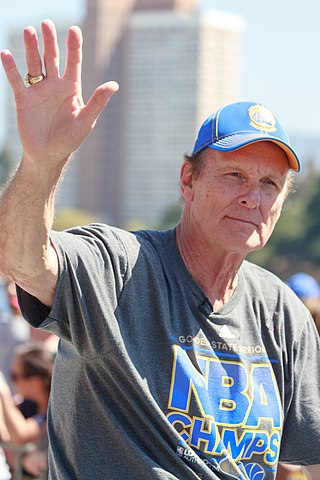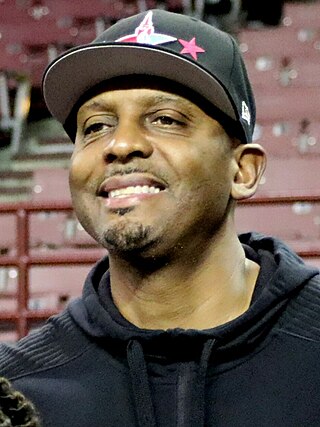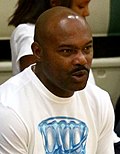
The Golden State Warriors are an American professional basketball team based in San Francisco. The Warriors compete in the National Basketball Association (NBA) as a member of the Pacific Division of the Western Conference. Founded in 1946 in Philadelphia, the Warriors moved to the San Francisco Bay Area in 1962 and took the city's name before changing its geographic moniker to Golden State in 1971. The club plays its home games at Chase Center.

Richard Francis Dennis Barry III is an American retired professional basketball player who starred at the NCAA, American Basketball Association (ABA) and National Basketball Association (NBA) levels. Barry ranks among the most prolific scorers and all-around players in basketball history. He is the only player to lead the National Collegiate Athletic Association (NCAA), ABA, and NBA in points per game in a season. He ranks as the all-time ABA scoring leader in regular season and postseason (33.5) play, while his 36.3 points per game are the most in NBA Finals history.

Christopher Paul Mullin is an American former professional basketball player, executive and coach. He is a two-time Olympic Gold medalist and a two-time Naismith Memorial Basketball Hall of Fame inductee.

Timothy Duane Hardaway Sr. is an American former professional basketball player. Hardaway played in the National Basketball Association (NBA) for the Golden State Warriors, Miami Heat, Dallas Mavericks, Denver Nuggets and Indiana Pacers. He was a five-time NBA All-Star and a five-time All-NBA Team member. Hardaway won a gold medal with the United States national basketball team at the 2000 Summer Olympics. He was known for his crossover dribble which was dubbed the "UTEP two-step" by television analysts. In 2022 Hardaway was inducted into the Naismith Memorial Basketball Hall of Fame.

Anfernee Deon "Penny" Hardaway is an American college basketball coach and former professional player who is the head coach of the Memphis Tigers men's team in the American Athletic Conference (AAC). Hardaway played college basketball at Memphis and 14 seasons in the National Basketball Association (NBA), where he was a four-time NBA All-Star and a three-time All-NBA Team member.

Donald Arvid Nelson is an American former professional basketball player and head coach. Nelson is second all-time in regular season wins of any coach in NBA history, with 1,335. He coached the Milwaukee Bucks, the New York Knicks, the Dallas Mavericks, and the Golden State Warriors. After an All-American career at the University of Iowa, Nelson won five NBA championships playing with the Boston Celtics, with his number 19 retired by the franchise in 1978.

Mitchell James Richmond III is an American former professional basketball player. He played collegiately at Moberly Area Community College and Kansas State University. He was a six-time NBA All-Star, a five-time All-NBA Team member, and a former NBA Rookie of the Year. In 976 NBA games, Richmond averaged 21.0 points per game and 3.5 assists per game. Richmond was voted into the Naismith Memorial Basketball Hall of Fame in 2014. His jersey No. 2 was retired in his honor by the Sacramento Kings, for whom he played seven seasons.

Guy William Rodgers was an American professional basketball player born in Philadelphia. He spent twelve years (1958–1970) in the NBA, and was one of the league's best playmakers in the early to mid-1960s. Rodgers led the NBA in assists twice, and placed second six times. Rodgers was inducted into Naismith Memorial Basketball Hall of Fame in 2014.

Billy Eugene Owens is an American former professional basketball player who played for several teams in the National Basketball Association (NBA). He played college basketball for Syracuse, where he was an All-American and the 1991 Big East Conference Player of the Year. Born in Carlisle, Pennsylvania, Owens played for Carlisle High School.
The 1991–92 NBA season was the 46th season of the National Basketball Association (NBA). The season ended with the Chicago Bulls winning their second straight NBA Championship, beating the Portland Trail Blazers 4 games to 2 in the NBA Finals. This was Larry Bird's final season as a player in the NBA.
Nellie Ball is an offensive strategy in basketball developed by NBA head coach Don "Nellie" Nelson. It is a fast-paced run-and-gun offense relying on smaller, more athletic players who can create mismatches by outrunning their opponents. A true center is usually not needed to run this type of offense. A large volume of three-point attempts is also a feature of Nellie Ball. This offense is most effective against teams that do not have the athleticism or shooting ability to keep up with the fast pace.
Peter Elman is an American writer, musician and teacher. Elman has performed and recorded with artists such as Peaches & Herb, Lacy J. Dalton, Roy Buchanan and Tom Johnston. In 1990, Elman recorded Durango Saloon, a collection of instrumental pieces inspired by the American West. In 1993, he followed that with Dakota Nights, and in 1994 released Race Point, an album that ranges from rock to Caribbean rhythms to plaintive ballads. 1998 brought First Take, an instrumental rock album featuring Stef Burns on guitar.
The history of the Golden State Warriors began in Philadelphia in 1946. In 1962, the franchise was relocated to San Francisco, California and became known as the San Francisco Warriors until 1971, when its name was changed to the current Golden State Warriors. Along with their inaugural championship win in the 1946–47 season, the Warriors have won six others in the team's history, including another in Philadelphia after the 1955–56 season, and five more as Golden State after the 1974–75, 2014–15, 2016–17, 2017–18 and 2021–22 seasons.
The 1990–91 NBA season was the Warriors' 45th season in the National Basketball Association, and 28th in the San Francisco Bay Area. The trio of Chris Mullin, Mitch Richmond, and second-year star Tim Hardaway were given the name "Run TMC" during the season. In the opening game, the Warriors defeated the Denver Nuggets 162–158, the highest-scoring regulation game in NBA history. Despite their scoring prowess, the Warriors were limited defensively. The team got off to a solid start winning seven of their first nine games, but later on played around .500 along the way. On February 26, 1991, they lost 131–119 to the Orlando Magic despite the Run TMC trio each scoring more than 30 points. At midseason, the team signed rookie guard Mario Elie after a brief stint with the Philadelphia 76ers. The Warriors held a 26–20 record at the All-Star break, and won their final five games of the season, finishing fourth in the Pacific Division with a 44–38 record.
The 1991–92 NBA season was the Warriors' 46th season in the National Basketball Association, and 29th in the San Francisco Bay Area. On the first day of the regular season, Run TMC was broken up when the Warriors traded star guard Mitch Richmond to the Sacramento Kings in exchange for top draft pick, and 6' 8" Syracuse forward Billy Owens, who was selected 3rd overall by the Kings in the 1991 NBA draft. Owen's additional height compared to Richmond's 6' 5" height was the size that head coach Don Nelson believed would complete the team. Nelson said he "was under pressure to get [the team] bigger" to improve the Warriors from a good team to a great one. "I’d never make that trade again", Nelson lamented. The Warriors started their season winning their first four games, then won 11 of their 15 games in February including an 8-game winning streak. The team held a 29–15 record at the All-Star break, and finished second in the Pacific Division with a 55–27 record, the most wins in a season for the franchise since 1975–76.
The 1989–90 NBA season was the Warriors' 44th season in the National Basketball Association, and 27th in the San Francisco Bay Area. With the 14th pick in the 1989 NBA draft, the Warriors selected Tim Hardaway from the University of Texas-El Paso. Hardaway teamed with All-Star forward Chris Mullin, and second-year star Mitch Richmond to form the threesome later known as Run TMC. The Warriors got off to a bad start losing 14 of their first 18 games, but posted two six-game winning streaks afterwards winning 12 of their next 15 games, and held a 23–24 record at the All-Star break. At midseason, the team traded Winston Garland to the Los Angeles Clippers. However, midway through the season, they struggled and fell below .500, missing the playoffs by finishing fifth in the Pacific Division with a 37–45 record.
The 1992–93 NBA season was the Warriors' 47th season in the National Basketball Association, and 30th in the San Francisco Bay Area. This season is most memorable when the Warriors drafted Latrell Sprewell from the University of Alabama with the 24th overall pick in the 1992 NBA draft. During the off-season, the team signed free agent Jeff Grayer. The Warriors were severely bitten by the injury bug all season losing their top players; Chris Mullin missed half the season with a torn ligament in his right thumb, only playing just 46 games, Tim Hardaway missed 16 games with a bruised right knee, Šarūnas Marčiulionis broke his right leg and dislocated his right ankle in a jogging accident before the season, returned to play 30 games, then sat out the rest of the year with Achilles tendonitis; and second-year star Billy Owens only played just 37 games due to a knee injury.
The 1994–95 NBA season was the Warriors’ 49th season in the National Basketball Association, and 33rd in the San Francisco Bay Area. During the off-season, the Warriors acquired Ricky Pierce and top draft pick Carlos Rogers from the Seattle SuperSonics. After having finished 50–32 the previous season, the Warriors made a number of deals to toughen the team in the middle by trading Billy Owens to the Miami Heat in exchange for Rony Seikaly. Before the season even started, second-year star Chris Webber began the season by exercising his option to become a restricted free agent, claiming irreconcilable differences with head coach Don Nelson. He asked to be traded, and the Warriors obliged, sending him to the Washington Bullets in exchange for Tom Gugliotta, who would later on be traded to the Minnesota Timberwolves in exchange for top draft pick Donyell Marshall midway through the season.
The 1993–94 NBA season was the Warriors' 48th season in the National Basketball Association, and their 31st in the San Francisco Bay Area. In the 1993 NBA draft, the Warriors selected Penny Hardaway from the University of Memphis with the third overall pick, but soon traded him to the Orlando Magic in exchange for top draft pick Chris Webber from the University of Michigan. During the off-season, the team signed free agent Avery Johnson. Without All-Star guard Tim Hardaway and sixth man Šarūnas Marčiulionis, who both missed the entire season with knee injuries, and with Chris Mullin missing the first 20 games with a finger injury, the Warriors struggled losing three of their first four games, but soon recovered later holding a 27–20 record at the All-Star break. The team improved over the previous season as they posted an 8-game winning streak in April, finishing third in the Pacific Division with a solid 50–32 record.












